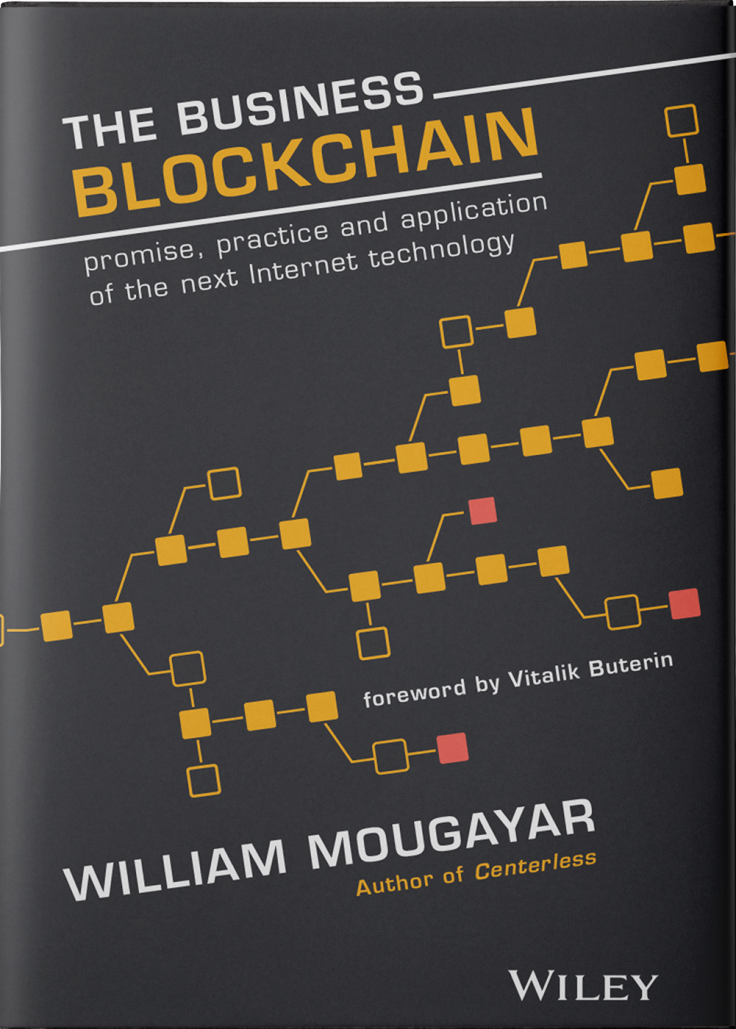The Business Blockchain by William Mougayar - Review

Near the start of his book, The Business Blockchain, William Mougayar says that he lucked out by living in Toronto, which meant he met Ethereum inventor Vitalik Buterin early on in his career. However, the truth is that Mougayar is one of a handful of people who saw the current revolution of decentralisation coming. In the first intimations of peer-to-peer, he saw the history of the present. This is the reason Mougayar bonded with the Ethereum project before most people had heard about it.
The book extends Mougayar's passion for decentralisation to the world of banks and financial institutions. His is an uncompromised vision, like that of the Ethereum project itself. As Buterin argues in his insightful foreword, "cryptoanarchists underestimated how flexible, technologically progressive, and even idealistic large corporations and banks can be". Banks doing private blockchains do not simply constitute cryptographically-enabled hegemony; it's more complex than that. In truth, banks don't fully trust one another either. As Mougayar's study shows, what blockchains can potentially solve is not only a technology problem, but also a game theory problem, whereby banks can collaborate without ending up owning each other.
Mougayar helps us understand the shift to decentralisation which is now becoming exponential by referring to the history of the Internet and the Web, a time-framework in which decades equal entire ages, peppered with landmark events: 1993 saw HTML change publishing; in 95 Java changed programming. Within this tradition of explosive change he locates banking and its "illusion of ownership", which really amounts to owning the gateway to a database, and which allows banks to partake in things like fractional reserving.
Enter the blockchain, the capabilities of which Mougayar usefully breaks down into three components: technology, business and legal. But before elaborating on these properties, Mougayar makes a hugely important point. You can read books, papers and articles about this technology but nothing conveys the power of decentralisation like downloading a Bitcoin wallet and watching as someone scans your QR code and instantly swipes currency into your phone or laptop – without the need for a banking relationship of any kind. This will make you start to question the need for intermediation, he says.

From here the book launches into a critique of trust. Mougayar explains that consensus systems operate by guaranteeing sets of rules within a protocol, which allows users to "out-source trust". Governments that squander our taxes, credit cards companies that charge 23% interest and utility companies that change their rates or terms with little notice are the "descendants of trust". However, the decentralisation of trust or "Trust 2.0 ... does not always depend on central intermediaries who may have become too big to fail, too bureaucratic to see risk, or too slow to change". Following on from this is a discussion of Airbnb's peer-based reputation system. This is an interesting point, not least given recent speculation that Airbnb was looking at blockchains, having hired a bunch of crypto-engineers. It's a question that informs further discussion about the interface between new forms of reputation and blockchain consensus systems.
Another interesting point concerns smart property, which "takes the concept of a digital asset further, and links the asset to a blockchain such that it can never be double-spent, double-owned or double-sent. If you are the creator or owner of these digital assets, imagine if you could also bind your ownership (or rights) in irrevocable ways that cannot be undone unless you decide to transfer or sell them. And it's all within your own control, not someone else's."
This raises potentially seismic questions about how the ownership of digital assets operates, or in other words, our digital net worth. The sort of control Mougayar is talking about currently resides with centralised web intermediaries. When you think about it, Apple's iTunes is an odd proposition; do I own my music that I have paid for or does Apple? This is already becoming an issue for incumbents of the gaming world where decentralised platforms trading in-game assets, such as FreeMyVunk, Ownage, or systems like Tokenly's Swapbots, are beginning to crop up all over the place.
Mougayar next tackles that well known term of art, "smart contracts". These are not smart and are not contracts; they are simply the applications that run on top of blockchains. Mougayar states, smart contracts will be no less revolutionary than the introduction of the HTML markup language that allowed information to be openly published and linked on the web.
He begins at a high level, citing the history of this concept from Nick Szabo coining the term, to Ian Grigg's iteration in Ricardian Contracts. He then drills into details, such as how smart contracts are designed to run on Ethereum powered by computation measured in ether, the network's native currency, in such a way that it prevents these running as infinite loops. This could be a consideration for business uses that unbundle blockchains from their native currencies.
At the heart of the book is a comprehensive and insightful evaluation of the crucial question of digital identity. Blockchain-based identity promises people empowerment and control of their identity, states Mougayar. Can a self-managed online identity supplant, or in a sense consolidate, the fragmentation of digital identities we use on Facebook and the like, for example. Will new types of certificate authorities be required to approve new identity systems – or will banks perhaps rise to that challenge? New self-sovereign identity solutions are emerging fast, such as the NYC-based Ethereum studio ConsenSys' uPort system, part of its "Internet of People" campaign.
Those already initiated to the world of blockchains will appreciate Mougayar's dive into complex subsets of the ecosystem such as potential of RegTech and the advent of Decentralised Autonomous Organisations (DAOs). In addition to ConsenSys, Mougayar takes time to mention other smart people working in the space of business and blockchain like the R3 project and Clearmatics, which is building a Decentralised Clearing Network (DCN) for over-the-counter derivatives.
The writing is on the wall for banks: this is their opportunity to be more innovative than they perhaps were with the Web first time round. As Mougayar points out, financial institutions, by virtue of the regulation that cocoons them, have been afforded a chance to manage their own disruption in a way that was denied to taxis and bed and breakfasts, for instance. Mougayar's hope is that they rise to the occasion.
© Copyright IBTimes 2025. All rights reserved.





















